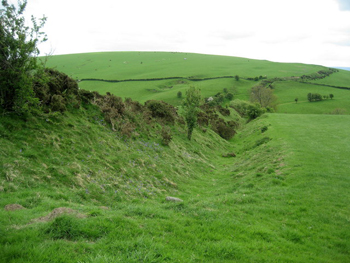"Aelwyd a Gymhell"
What I Learned in Wales This Summer
For Sunday September 15, 2013
Lectionary Readings (Revised Common Lectionary, Year C)
Jeremiah 4:11–12, 22–28 or Exodus 32:7–14
Psalm 14 or Psalm 51:1–10
1 Timothy 1:12–17
Luke 15:1–10
This summer my wife and I walked the 177-mile Offa's Dyke Path — in Welsh, Llwybr Clawdd Offa. It's one of fifteen National Trails in the United Kingdom. The path follows the remains of the earthwork built by King Offa in the eighth century to mark the boundary between England and Wales.
We started at Chepstow, across the street from an 11th-century castle, then walked north fifteen miles a day for twelve days. We finished at Prestatyn on the Irish Sea, near Liverpool. Highlights included Tintern Abbey, built in 1131 and the inspiration for Wordsworth's poem, and the "hill forts" in the Clwydian Range that date to 700 BC.
 |
Chepstow Castle. |
Getting away from the books, cell phone, and computer were therapeutic. Walking with our daughter, who just graduated from college, was special indeed. We met fellow hikers from Germany and Australia, indulged in "cream tea," talked with Welsh sheep farmers, and enjoyed the village pub life (where dogs are welcomed). We had only three hours of drizzle in two weeks.
This was our third long walk. Two summers ago we hiked the Wainwright coast-to-coast path in northern England. Last summer we walked the 500-mile Way of St. James in Spain. About 60 days and 1,000 miles of walking. Every day dirty and delightfully dead tired. Every night a different village and bed.
And at each stop, a warm welcome.
No matter how muddy or sweaty we were, our hosts welcomed us. "Walking Holidays" are common in the UK. When you stumble in at the end of a long day, they are ready for you. They stuff newspapers into your wet boots, then put them in a drying room. Then they offer you hot tea.
My favorite stop was a farm house called Plas Penucha in Caerwys, Wales. The forty-acre property has been in the family almost five hundred years. We slept with the window open to enjoy the total quiet. Mrs. Price served us homemade chicken pot pie.
 |
Offa's Dyke. |
In the reception hall at Plas Penucha there's an old fireplace with an oak beam. Carved into the beam is a Welsh message: AELWYD A GYMHELL, "A Welcoming Hearth Beckons." You are welcome here.
The life of Jesus revealed the heart of God. He does this with crystalline clarity in the gospel for this week.
Luke writes, "this man welcomes sinners and eats with them." To emphasize this Divine Welcome, God's unconditional acceptance, Jesus tells three parables that repeat the same point — the lost sheep, the lost coin, and the lost son.
People felt safe with Jesus. He exuded compassion.
Jesus welcomed all the people we ignore and despise. The sexually suspicious. The religiously impure. Ethnic outsiders. Rich tax scammers and lazy poor people. Soldiers of the Roman oppressors. The chronically sick and the mentally deranged. Women, widows and children. His closest disciples who betrayed him.
The only people who didn't feel safe with Jesus were the religious experts who appointed themselves as gatekeepers of God's love. They had good reasons to feel unsafe. In Matthew 23 Jesus denounced them with "seven woes" as hypocrites, snakes, and blind guides.
 |
Tintern Abbey. |
When Jesus welcomed the unwelcome, when he accepted the unacceptable without any preconditions, he angered the religious experts. Luke says that they "muttered." In the parable of the prodigal son, the older son got angry at his father's indiscriminate compassion for his younger brother.
Whether then or now, there's a bitter irony in how the simple act of accepting a person angers some people. But whereas the gatekeepers get angry, Jesus says three times that there's "joy in heaven" when the lost is found, the dead is enlivened, and the prodigal is welcomed.
In this week's epistle, Paul uses himself as an example of God's "unlimited patience." God's welcome, says Paul, is "a trustworthy saying that deserves full acceptance."
Throughout the New Testament, Paul describes himself as a former religious zealot who tried to exterminate the early Christian movement.
In Acts, he supported the stoning of Stephen, the first Christian martyr. "Breathing threats of murder," Paul collaborated with authorities to track down believers from house to house, drag them back to Jerusalem, and imprison them. He worked fervently to "destroy the church."
To the Corinthians he admitted that he didn't deserve to be called an apostle, and was instead the "least of the apostles" because of his violent past.
To the Galatians Paul wrote, "For you have heard of my previous way of life in Judaism, how intensely I persecuted the church of God and tried to destroy it. I was advancing in Judaism beyond many Jews of my own age and was extremely zealous for the traditions of my fathers."
To the Philippians he bragged, "as to zeal, a persecutor of the church."
 |
Plas Penucha. |
And in this week's epistle to Timothy, as an old man Paul was still haunted by his past. He describes himself as "formerly a blasphemer and a persecutor and a violent aggressor."
But God welcomed Paul. And his conversion moved him from violent aggression to indiscriminate love.
You don't need to do anything to receive God's welcome, because there's nothing to do. God welcomes us just like we are and right where we are. Martin Luther described faith as the beggar's empty hand that accepts a gift.
The only thing to do is to accept that we are accepted. In the words of Paul Tillich, "You are accepted. You are accepted by that which is greater than you, and the name of which you don’t know… Simply accept the fact that you are accepted. If that happens, we experience grace."
"Grace tells us that we are accepted just as we are," writes Donald McCullough. "We may not be the kind of people we want to be, we may be a long way from our goals, we may have more failures than achievement . . but we are nonetheless accepted by God, held in his hands. Such is his promise to us in Jesus Christ, a promise we can trust."
And so the very last line of Terrence Malick's movie To the Wonder (2013) says it best: "Love that loves us, thank you."
Image credits: (1) Wikipedia.org; (2) Wikipedia.org; (3) Wikipedia.org; and (4) North Wales Tourism.





